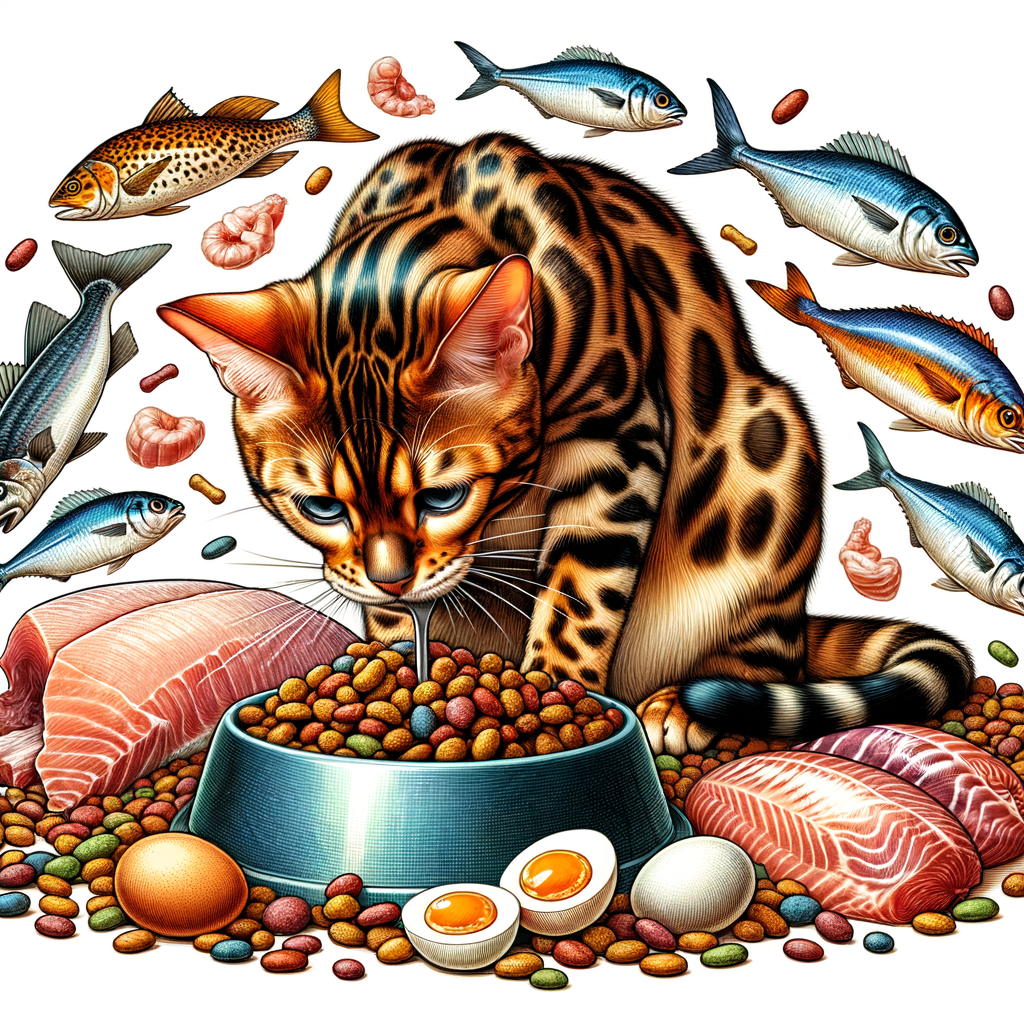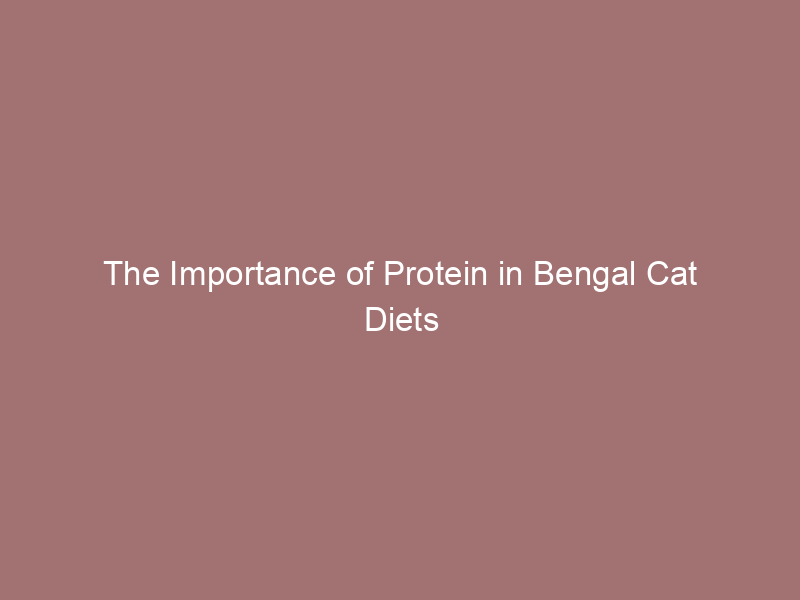
The Importance of Protein in Bengal Cat Diets
Understanding Bengal Cat Protein Needs
-
Why protein is crucial for Bengal cats:
Protein is essential for Bengal cats because it helps build and repair tissues. It also supports their immune system and provides energy. Without enough protein, Bengal cats can become weak and unhealthy.
-
The role of protein in Bengal cat health and diet:
It plays a vital role in keeping Bengal cats healthy. It helps maintain their muscles, skin, and fur. A diet rich in protein ensures that Bengal cats have the strength and energy they need to stay active and playful.
-
How much protein a Bengal cat needs daily:
Bengal cats typically need a diet that consists of at least 30-40% protein. This amount can vary based on their age, weight, and activity level. Consult with a vet to determine the exact protein needs for your Bengal cat.
Bengal Cat Diet Tips
- Choosing High Protein Cat Food
When selecting food for your Bengal cat, look for options that are high in protein. Bengal cats are active and need protein to maintain their energy levels. Choose cat food that lists meat, like chicken or fish, as the first ingredient. Avoid foods with fillers like corn or soy.
- Understanding Bengal Cat Dietary Requirements
They require a balanced diet rich in protein, fats, and essential vitamins. Protein helps build strong muscles, while fats provide energy. Make sure your Bengal cat’s diet includes taurine, an essential amino acid for heart and eye health.
- How to Balance a Bengal Cat’s Diet
Too much or too little of any nutrient can cause health problems. Feed your cat a mix of wet and dry food to ensure they get enough moisture. Wet food can help keep them hydrated, while dry food helps keep their teeth clean. Consult your vet to create a diet plan tailored to your cat’s needs.
| Nutrient | Importance | Sources |
|---|---|---|
| Protein | Builds muscles and provides energy | Chicken, Fish, Turkey |
| Fats | Provides energy and supports cell function | Fish oil, Chicken fat |
| Taurine | Essential for heart and eye health | Meat, Fish |
High Protein Cat Food: What to Look For
Protein Sources for Bengal Cats
Different sources of protein can affect your cat’s health in various ways. Here are some key protein sources to consider:
-
Animal-based proteins:
These are proteins that come from meat, fish, and poultry. Animal-based proteins are usually the best for Bengal cats because they are similar to what cats would eat in the wild. Examples include chicken, beef, and salmon. These proteins provide essential amino acids that help with muscle growth and overall health.
-
Plant-based proteins:
These proteins come from plants like soy, peas, and lentils. While they can be part of a balanced diet, they are not as complete as animal-based proteins. Plant-based proteins can be used to supplement the diet but should not be the main source of protein for Bengal cats.
-
Protein-rich food for Bengal cats:
Look for cat food that lists a high-quality protein source as the first ingredient. Foods that are specifically formulated for Bengal cats often have higher protein content to meet their active lifestyle needs. Brands like Blue Buffalo, Royal Canin, and Wellness offer high protein options that are well-regarded by pet owners.
| Protein Source | Examples | Benefits |
|---|---|---|
| Animal-based | Chicken, Beef, Salmon | Complete amino acids, supports muscle growth |
| Plant-based | Soy, Peas, Lentils | Supplemental protein, less complete |
| High Protein Cat Food | Blue Buffalo, Royal Canin, Wellness | Formulated for Bengal cats, higher protein content |
Best Protein for Bengal Cats
-
Reviewing Top High Protein Cat Food Brands
Here are some top high protein cat food brands:
- Blue Buffalo Wilderness: Known for its high protein content and natural ingredients.
- Wellness CORE: Offers grain-free options with high-quality animal proteins.
- Orijen Cat & Kitten: Contains a variety of animal proteins and is biologically appropriate.
These brands provide the necessary protein to keep your Bengal cat active and healthy.
-
Case Study: Bengal Cats Thriving on High Protein Diets
A study conducted by American Veterinary Medical Association showed that Bengal cats on high protein diets had improved muscle mass and energy levels.
One Bengal cat owner, Sarah, shared her experience: “After switching to a high protein diet, my Bengal cat, Leo, became more energetic and his coat looked shinier.”
This case study highlights the positive impact of high protein diets on Bengal cats.
-
Key Takeaways: Choosing the Best Protein for Your Bengal Cat
Here are some key points when choosing the best protein for your Bengal cat:
- Opt for animal-based proteins like chicken, fish, or beef.
- Avoid fillers and artificial ingredients.
- Look for brands with high protein content and natural ingredients.
By following these tips, you can ensure your Bengal cat gets the best nutrition possible.
Bengal Cat Nutrition: Beyond Protein
Optimal Diet for Bengal Cats
While protein is crucial for Bengal cats, their diet needs more than just protein to keep them healthy and happy.
- Importance of hydration
They need plenty of water to stay healthy. Make sure your cat always has fresh water available. Wet cat food can also help keep them hydrated.
- Role of fats and carbohydrates
Fats are also important for a shiny coat and healthy skin. Look for foods with healthy fats like fish oil. Carbohydrates should be limited but can provide quick energy.
- Vitamins and minerals in a Bengal cat’s diet
Calcium helps with strong bones, and taurine for heart health. Make sure your cat’s food has a good balance of these nutrients.
| Nutrient | Importance |
|---|---|
| Water | Keeps the cat hydrated and supports kidney function. |
| Fats | Provides energy and supports skin and coat health. |
| Carbohydrates | Offers quick energy but should be limited. |
| Vitamins | Supports overall health and specific functions like vision and immunity. |
| Minerals | Essential for bone health and metabolic functions. |
Common Diet-Related Health Issues in Bengal Cats
- ObesityIt can lead to other health issues like diabetes and joint problems. To prevent obesity, ensure your cat gets enough exercise and eats a balanced diet. Avoid overfeeding and monitor their weight regularly.
- Urinary Tract ProblemsThese issues often arise from a lack of hydration or a diet high in certain minerals. To help prevent these problems, make sure your cat drinks plenty of water. Wet cat food can also help keep them hydrated.
- Food AllergiesFood allergies can cause symptoms like itching, vomiting, and diarrhea in Bengal cats. Common allergens include certain proteins, grains, and additives. If you suspect your cat has a food allergy, consult your vet. They may recommend an elimination diet to identify the allergen.
| Health Issue | Prevention Tips |
|---|---|
| Obesity | Regular exercise, balanced diet, monitor weight |
| Urinary Tract Problems | Ensure hydration, provide wet food |
| Food Allergies | Identify allergens, consult vet, elimination diet |






